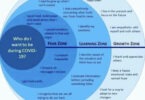YES! There is no denying eggs are loaded with cholesterol. But, this is a good thing because cholesterol does the body good.
Eggs & The Cholesterol Connection
In the past, cholesterol was thought to be the primary link to heart disease. Any high cholesterol food was demonized. It was believed that those who ate these foods would drop dead of a heart attack. Now we know much more about the benefits of cholesterol.
Before you toss your egg and replace it for “healthier” foods. Consider that cholesterol:
- In the blood comes from both food and our liver. The liver helps balance cholesterol. When you do not eat cholesterol, your body supplies itself with what it needs.
- Is one component that makes up the cell membrane. It plays a role in cell signaling and transporting, nerve function and helps to keep the cell healthy.
- As bile, aids in the digestion and absorption of fat including vitamins and minerals.
- Synthesizes sex hormones (testosterone, estrogen, progesterone), vitamin D and corticosterioids.
- Supports heart, nerve, and brain health. Cholesterol is good unless the size of the lipoprotein particles (LDL and HDL) are small and dense. Large particles are good.
Cholesterol supplied by an egg or any food is not disastrous. It simply allows your body to function normally. Additionally, I think it is interesting to look beyond cholesterol and identify the beneficial nutrients you gain from eating eggs.

To Eat Eggs Or Not To Eat Eggs? That is the question.
Are you scared to eat eggs? If you eat an egg, you might think you will get a heart attack. Maybe not, but who knows? The debate rages on. Research has gone back and forth for years! So the jury is still out, or is it?
Recently, there was another published study showing an association between eating eggs and an increased risk of heart disease and death.
It was a cohort study, thus it doesn’t establish eggs as a culprit in causing heart disease. The study used participant food recall as the basis of sorting through data. Meanwhile, the authors send a strong message that eating cholesterol, including eggs increases heart disease risk. It is a hard-pressed message to use their findings as a message to steer the public away from eating eggs.
We know the more cholesterol you eat from natural sources (such as eggs, butter, and steak), the less cholesterol is made by your liver. Additionally, it has been established that eggs do not cause inflammation or influence heart disease markers such as C reactive protein.
Enjoy Eating Eggs Without Fear
Unlike the cohort studies (based on food recall) that seem to suggest eggs are harmful there is plenty of research that clinically measures the effects of actually eating eggs.
For example:
Egg intake was shown to convert at-risk individuals (small dense high-risk LDL) for heart disease to large less risky LDL.
Interestingly, based on these results, the benefits of egg consumption may include preventing heart disease not causing it.
Heart disease is considered a metabolic dysfunction. When older adults consumed low-fat high-carbohydrate breakfasts risk of metabolic disease increased. Insulin was lower in participants who ate, ≥1 whole egg 5 days/week.
When You Eat An Egg, What Are You Eating “EGGS”actly?
You will find the typical nutrition information for an egg easily. Many of us understand that the yolk is where all the fat and cholesterol lurk. Therefore, they only eat the white.
Egg whites provide some nutrition: protein, sodium, riboflavin, and selenium. But why discard the yolk? Whole eggs are nutritious.
Nutrients in Whole Eggs
VITAMINS |
FUNCTIONS |
|
| Vitamin D | Eggs are an important food for those who are lactose intolerant or choose to avoid dairy because they are naturally high in vitamin D. Additionally, it supports bone, mental and immune health and may reduce cancer risk. | |
| Vitamin B6 | Reduces high homocysteine levels (a heart disease risk factor). Helps alleviate PMS symptoms and is important for healthy oxygen in the blood. | |
| Vitamin B12 | DNA synthesis and is involved in red blood cell production | |
| Vitamin B9 (Folate ) | Needed to prevent neural tube defects, lowers homocysteine levels, and protects DNA. | |
| Vitamin B2 (Riboflavin) | Plays a role in liver, bone and heart health | |
| vitamin B5 (Pantothenic Acid) | Works to reduce cholesterol and triglycerides aids in the new formation of blood cells and sex hormones. | |
| Vitamin B3 (Niacin) | Lowers triglycerides and cholesterol helps slow narrowing of the arteries and helps brain function. | |
| Vitamin H (Biotin) | Supports the skin, hair, and nails. | |
| Vitamins A | Strengthens the immune system, contributes to healthy eyes | |
| Vitamins E | Protects the cell from oxidation. | |
| Vitamins K | Fosters healthy bones and blood clotting. |
MINERALS |
FUNCTIONS |
| Calcium | Builds bone, supports muscle function, blood clotting, and heart health. |
| Magnesium | Energy production, protein synthesis, blood pressure, and blood sugar control. |
| Iron | Carries oxygen throughout the body helping to boost energy |
| Phosphorous | Cellular growth and repair; strengthens bones and fosters the utilization of carbohydrate and fat. |
| Potassium | Works with sodium to maintain fluid balance and blood pressure, involved in muscle and heart contractions. Too much potassium will affect the heart and can be fatal |
| Sodium | Maintains fluid balance and blood pressure. |
| Zinc | Boosts the immune system. Vital to wound healing, aids in the senses of taste and smell. Important for the heart. |
| Thiamin | Nutrient metabolism and contributes to liver function. |
| Selenium | Needed for heart health and thyroid function. |
MORE NUTRIENTS |
FUNCTIONS |
| Lutein & Zeaxanthin | Protects the eyes from blue light and supports good vision. |
| Lecithin & Choline | Important for maintaining cell structure and brain (mood memory) development. Involved in DNA. Lecithin is used as a natural supplement. Specifically, it lowers cholesterol and supports the liver as a result of alcohol abuse. |
Hyper focusing on cholesterol as a reason to avoid eggs seems senseless. Eggs provide a broad range of nutrients that contribute to good heart health and overall wellness.
You Can Put All Your Eggs In One Heart-Healthy Basket
If you enjoy eating eggs, eat them! Eggs are full of nutrients. Do not be afraid to a eat natural food that tastes good, satisfies your appetite and is good for your health. Total cholesterol is just a number. Research the important risk factors (C-reactive protein, insulin, triglycerides, small dense LDL Vs. large buoyant LDL) that specifically relate to good heart health.
It’s up to you. Are you confident that you can put your eggs in a heart-healthy basket?






